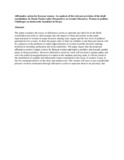| dc.contributor.author | Wanyande, Peter | |
| dc.date.accessioned | 2013-05-02T07:41:55Z | |
| dc.date.available | 2013-05-02T07:41:55Z | |
| dc.date.issued | 2003 | |
| dc.identifier.citation | Henrich Boll Foundation, East and North Africa Region | en |
| dc.identifier.uri | http://erepository.uonbi.ac.ke:8080/xmlui/handle/123456789/18248 | |
| dc.description.abstract | The paper examines the issues of affirmative action as currently provided for in the Draft constitution and seeks to shed insights into the impact of these provisions on the under- representation of women in major decision making state organs and the low level of political participation by women. In short the paper seeks to find out whether or not these provisions will be a panacea to the problems of under representation of women in public decision-making institutions including parliament and local authorities. The paper argues that the proposed affirmative action is major victory for Kenyan women and marks a positive step towards gender parity in Kenyan politics. However affirmative action by itself will not lead to gender parity and solve the political marginalization of women in the medium and long term. It will not result in the nomination of capable and influential women committed to the cause of women. It may in fact be counterproductive in the short and medium run. The women will have to put considerable pressure on those nominated through affirmative action to represent them to do precisely that | en |
| dc.language.iso | en | en |
| dc.title | Affirmative action for Kenyan women: An analysis of the relevant provision of the draft constitution. In Maria Nzomo (edts) Perspectives on Gender Discourse. Women in politics: Challenges on democratic transition in Kenya | en |
| dc.type | Article | en |
| local.publisher | Department of Political Science, University of Nairobi | en |

